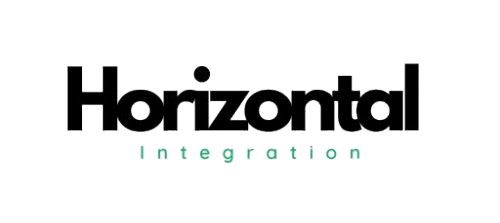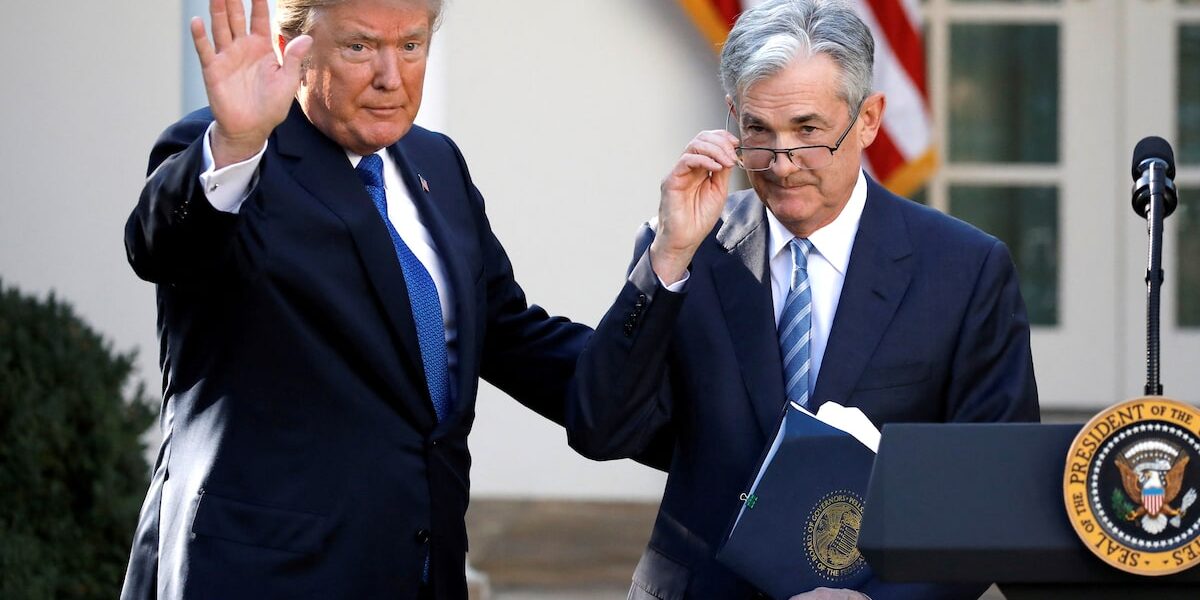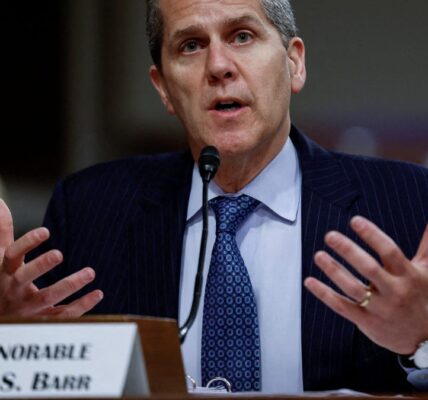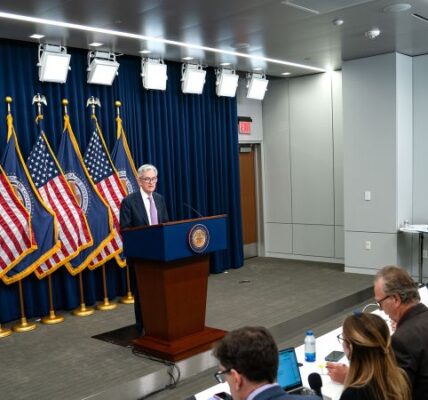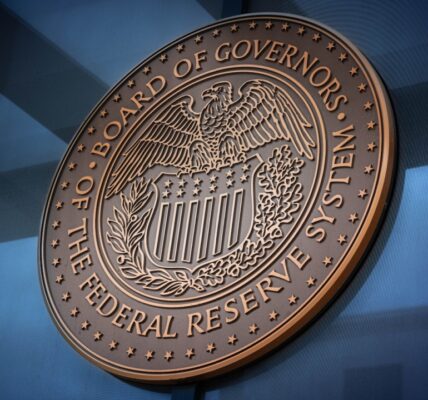Opinion: U.S. Federal Reserve will increasingly find itself in the crosshairs of president-elect Trump
Former U.S. president Donald Trump gestures with Jerome Powell, his nominee to become chairman of the U.S. Federal Reserve at the White House in Washington, on Nov. 2, 2017.Carlos Barria/Reuters
U.S. president-elect Donald Trump says he has no plans to fire Federal Reserve chair Jerome Powell. But that doesn’t mean he isn’t girding for a fight.
Strong economic growth and stubborn inflation have prompted the Fed to signal that it’s in no hurry to cut interest rates further in 2025, setting the stage for renewed conflict between the two men over how best to manage the world’s largest economy.
Mr. Trump, who made an illogical campaign promise to lower interest rates, has already demonstrated that he doesn’t respect Mr. Powell or the central bank’s independence.
Sure, he selected Mr. Powell to lead the Fed during his first term as president. But Mr. Trump’s goodwill proved to be short-lived. He later branded Mr. Powell an “enemy” of the American people and disparaged the Fed as “weak” – a catch-all put-down he uses frequently.
More recently, he mused that the president should have a “say” on interest rates and accused Mr. Powell of “playing politics” by cutting interest rates in September to give the Democrats an edge with voters. Mr. Trump’s key supporters also ramped up their public attacks on the Fed after he won the presidential election.
“It is reflective of both his authoritarian tendencies and his lack of understanding of institutions,” said Joseph Stiglitz, a Nobel Prize-winning economist and former chair of the U.S. Council of Economic Advisers under U.S. president Bill Clinton.
Also a former chief economist of the World Bank, Mr. Stiglitz was recently in Toronto to promote his new book, The Road to Freedom: Economics and the Good Society, at the University of Toronto’s Rotman School of Management.
The significance of institutions, including the Fed, is a timely topic. As Mr. Stiglitz pointed out in our interview, the 2024 Nobel Memorial Prize in Economic Sciences was awarded to a trio who highlighted the importance of societal institutions for a country’s economic growth and prosperity.
“Trump does not understand anything of it. He wants to destroy institutions and he’s going about doing it,” Mr. Stiglitz said. “He thinks of everything through political and transactional terms.”
Mr. Trump is sure to throw more sucker punches after he takes office on Jan. 20. It doesn’t matter that Mr. Powell has no intention of resigning and that Mr. Trump has no legal authority to dismiss him. Mr. Powell and the Fed make for convenient scapegoats.
After all, Mr. Trump’s cornerstone campaign promises to slap punitive tariffs on Canada, Mexico and China, deport record numbers of illegal migrants and cut taxes are all expected to stoke inflation, keeping interest rates elevated.
So he will need to shift the blame. What’s more, he has no compunction about demeaning Mr. Powell, whose term as chair expires in May, 2026, or the Fed, a storied institution, to make political hay.
“There’s no principle here on how you manage interest-rate policy. That’s not the issue,” Mr. Stiglitz said, referring to Mr. Trump.
“It’s control – control for his benefit when he’s in office and against his enemies when he’s not in office. So that’s his principle. Jay Powell has said he’s not going to resign, and so there’ll be a lot of tension.”
Warnings about the risk of political interference at the Fed are growing louder. Earlier this week, The Wall Street Journal published an opinion piece by former Fed vice-chairman Alan Blinder, who questioned whether Mr. Trump would respect the central bank’s independence.
Mr. Blinder pointed to a key example of political meddling from U.S. history. During the 1970s, the central bank’s independence was compromised by then-president Richard Nixon, who put pressure on Fed chairman Arthur Burns to engage in expansionary monetary policies ahead of the 1972 election, resulting in rampant inflation. The Fed’s independence was restored by Paul Volcker, who was chairman from 1979 to 1987.
Months before his death in 2019, Mr. Volcker and other former Fed chairs Alan Greenspan, Ben Bernanke and Janet Yellen jointly authored an op-ed about the importance of a non-partisan Fed. It was published during Mr. Trump’s first term as president.
“It is critical to preserve the Federal Reserve’s ability to make decisions based on the best interests of the nation, not the interests of a small group of politicians,” they wrote.
Team Trump 2.0, however, is steeped in scorn for the Fed. Scott Bessent, a hedge-fund manager who was selected to serve as secretary of the treasury, once suggested that Mr. Trump name Mr. Powell’s successor as a “shadow Fed chair” to undermine him, Barron’s reported in October. He has since backpedalled that idea.
Tech billionaire Elon Musk, who will co-lead the Department of Government Efficiency, has argued that “the Fed is absurdly overstaffed.” Stephen Miran, who is heading the Council of Economic Advisers, has previously accused Mr. Powell of having a partisan bias.
“I have to compare that, contrast that, with what life was like when I was in the Clinton administration. There was such respect for the independence of the Fed that we were told we were not allowed to criticize the Fed,” Mr. Stiglitz said.
“I sort of chafed at that. I said, ‘I think public discussion is good. I should have the right to criticize. I can’t dictate what they do, but I like a robust discussion.’ But I highlight that because that was how strong we felt about institutions.”
Mr. Powell, who has declined to speculate about the economic impact of Mr. Trump’s policies, cut interest rates again in November and December. The federal-funds rate is currently between 4.25 per cent and 4.5 per cent.
Still, Mr. Powell’s resolve to remain above the political fray will be tested again not long after inauguration day. The Fed is expected to stand pat on rates at its Jan. 29 meeting. It’s a foregone conclusion that there will be more conflict ahead.
